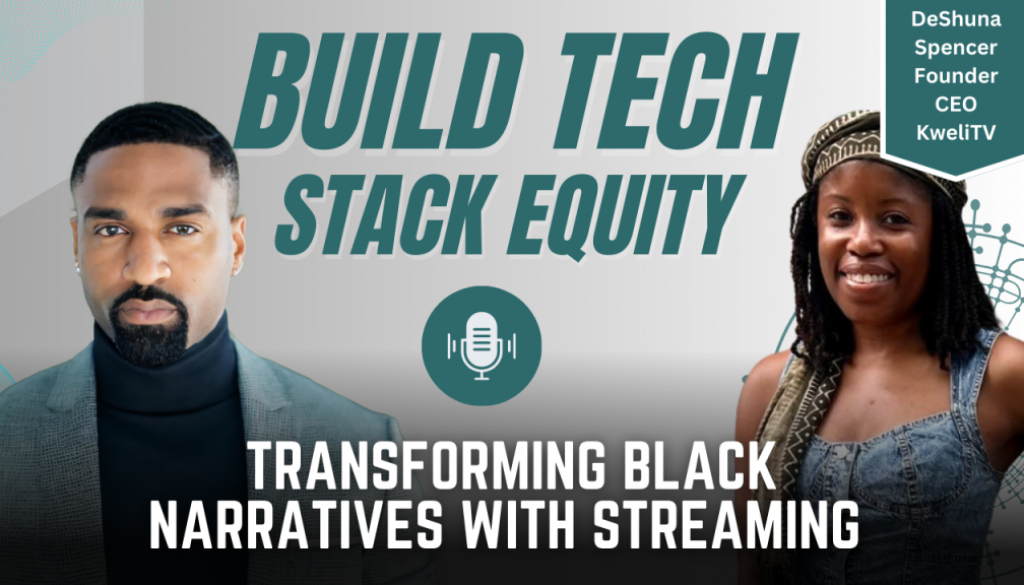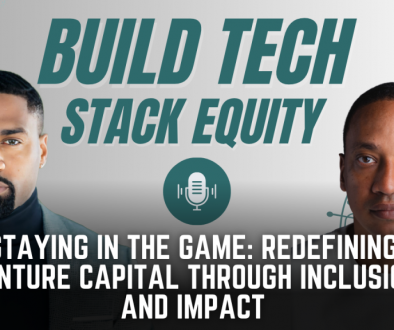From Trauma to Triumph: How DeShuna Spencer Built Kweli TV, A Global Home for Authentic Black Diaspora Stories
In the world of media, a dark mantra often dictates the headlines: “If it bleeds, it leads.” For a young DeShuna Spencer, working as a daily news journalist, this wasn’t just a phrase—it was a traumatizing reality. Tasked with reporting on crime, she found herself on the front lines of tragedy, a position that ultimately forced her to question the very nature of her profession.
In a recent episode of the Build Tech Stack Equity Podcast, Spencer sat down with host Darius Grant to share the powerful story of how a heartbreaking moment as a reporter became the catalyst for building Kweli TV, a global streaming platform dedicated to authentic Black stories.
The Breaking Point
As a young journalist, Spencer’s days were filled with covering the grim realities of crime. The turning point came during a call to the mother of a murder victim, a call she was pushed to make by her editor.
“I said, ‘I’m sorry, I’m Deshawna. I’m with Oakland Tribune, I’m sorry for your loss,'” Spencer recalled. “And they were like, ‘Sorry for your loss? We just left the hospital that says she was still alive.’ And then the woman starts crying hysterically.”
In that moment, Spencer realized she wasn’t just reporting the news; she was an instrument of trauma. “I realized that I was a part of a problem,” she said. “I wasn’t impacting my community through storytelling.”
Building a Home for the Global Black Community
That experience ignited a new mission: to create a space that celebrated the vast, diverse, and nuanced reality of the Black experience, free from the stereotypes and trauma-porn that dominate mainstream media.
That vision became Kweli TV (Kweli means “truth” in Swahili).
“From day one, it’s all about the Black people from around the world,” Spencer explained. Today, Kweli TV hosts over 800 titles, featuring stories from the Caribbean, Latin America, Europe, Australia, and Africa. It’s a platform built on a few core principles:
- Authenticity: Telling stories that are true to the culture they represent.
- A Safe Space: Creating a platform where the community won’t be bombarded with traumatic content. There is a strict “no reality TV” policy.
- Representation for All: A significant focus is on children’s programming, ensuring Black children can see themselves represented authentically on screen.
The Unfiltered Reality of a Non-Technical Founder
DeShuna’s journey was far from easy. As a non-technical founder, she faced a steep learning curve. After winning a $20,000 journalism competition, she hired a developer to build the first version of the platform.
“He was about 90% done,” she recalled, “and I never heard from him again.”
Left with an unfinished product and no technical co-founder, Spencer was inspired by a quote from the co-founder of LinkedIn: “If you’re not embarrassed by the first version of your product, you launched too late.” She decided to release the buggy, 90%-done beta to the world.
For nearly three years, she ran the platform through sheer will, manually resetting user passwords via email and learning from a constant stream of customer feedback. “It was horrible,” she admitted, “but it’s the joys of being a startup.”
Taking Control of Her Destiny
Tired of waiting for a technical savior or VC funding that rarely materializes for Black female founders, Spencer decided to take matters into her own hands. She entered a pitch competition at Harvard Business School and won, providing the capital needed to partner with a professional third-party tech vendor.
This shift was crucial. Spencer learned that even giants like Netflix don’t build everything in-house. Her advice to other founders is to find a tech partner who believes in your mission and can grow with you.
“I decided to not rely on other people to dictate my destiny,” she stated. “How do we allow our community to keep ourselves alive versus relying on someone in Silicon Valley?”
DeShuna Spencer’s story is a masterclass in resilience, mission-driven entrepreneurship, and the power of creating the change you want to see in the world.
To hear her full, inspiring journey and learn more about her advice for non-technical founders, listen to the complete conversation on the Build Tech Stack Equity Podcast. Follow us for more stories of the incredible entrepreneurs and investors shaping the future of technology.




